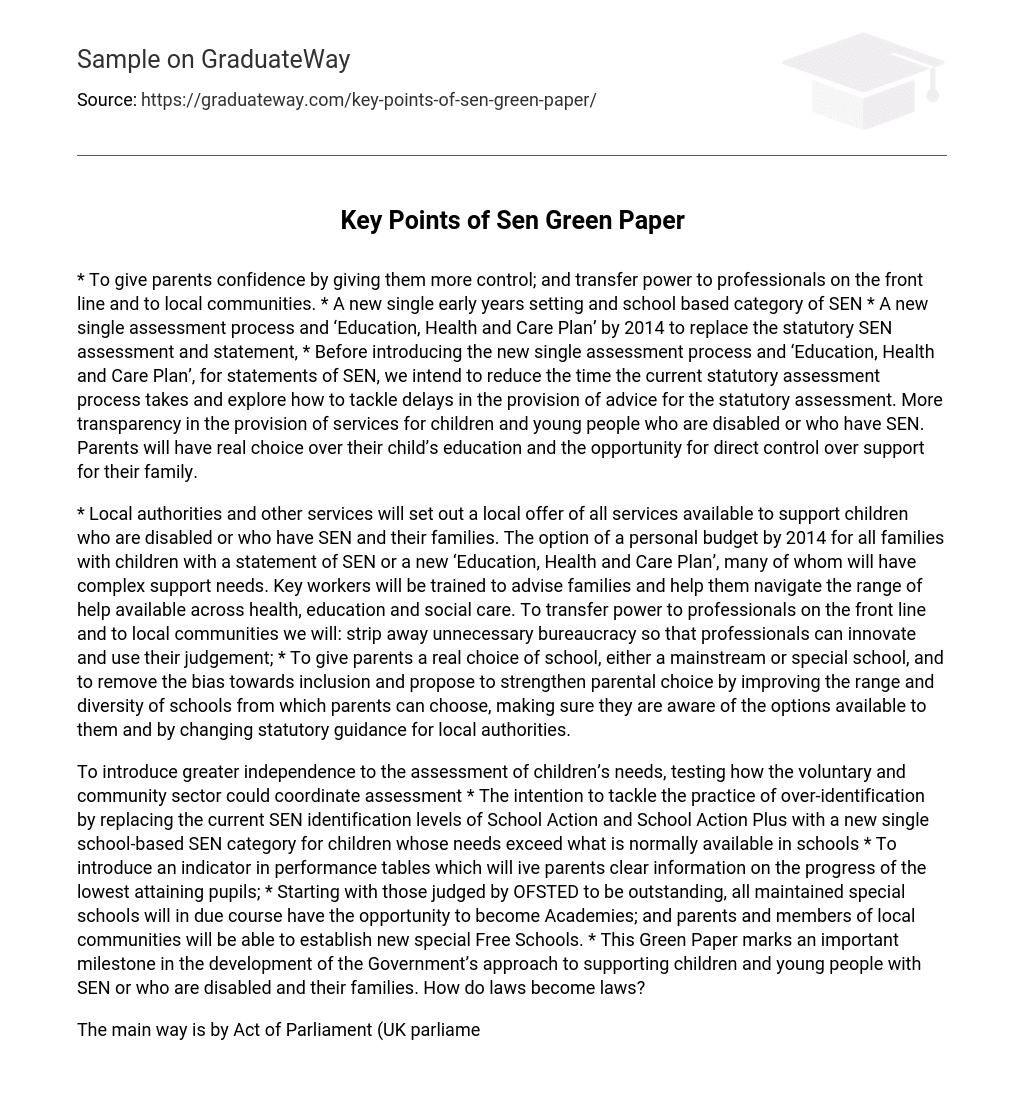A new single early years setting and school based category of SEN. A new single assessment process and ‘Education, Health and Care Plan’ by 2014 to replace the statutory SEN assessment and statement, Before introducing the new single assessment process and ‘Education, Health and Care Plan’, for statements of SEN, we intend to reduce the time the current statutory assessment process takes and explore how to tackle delays in the provision of advice for the statutory assessment. More transparency in the provision of services for children and young people who are disabled or who have SEN. Parents will have real choice over their child’s education and the opportunity for direct control over support for their family.
Local authorities and other services will set out a local offer of all services available to support children who are disabled or who have SEN and their families. The option of a personal budget by 2014 for all families with children with a statement of SEN or a new ‘Education, Health and Care Plan’, many of whom will have complex support needs.
Key workers will be trained to advise families and help them navigate the range of help available across health, education and social care. To transfer power to professionals on the front line and to local communities we will: strip away unnecessary bureaucracy so that professionals can innovate and use their judgement; To give parents a real choice of school, either a mainstream or special school, and to remove the bias towards inclusion and propose to strengthen parental choice by improving the range and diversity of schools from which parents can choose, making sure they are aware of the options available to them and by changing statutory guidance for local authorities.To introduce greater independence to the assessment of children’s needs, testing how the voluntary and community sector could coordinate assessment.
The intention to tackle the practice of over-identification by replacing the current SEN identification levels of School Action and School Action Plus with a new single school-based SEN category for children whose needs exceed what is normally available in schools. To introduce an indicator in performance tables which will ive parents clear information on the progress of the lowest attaining pupils; Starting with those judged by OFSTED to be outstanding, all maintained special schools will in due course have the opportunity to become Academies; and parents and members of local communities will be able to establish new special Free Schools.
This Green Paper marks an important milestone in the development of the Government’s approach to supporting children and young people with SEN or who are disabled and their families. How do laws become laws? The main way is by Act of Parliament (UK parliament) or Act of the Scottish Parliament in Scotland, or of the Welsh Assembly. Acts of the UK parliament can apply to the whole of the UK, even Scotland and Wales, although they have devolved assemblies. The next major way is by delegated legislation (local by-laws, regulation, orders in council, etc. ). The next is common law – not everything is covered in Acts of Parliament (for example no Act of Parliament states the law on murder; this is a matter of common law in England and Wales).
What has been decided by judges in the absence of statute – common law – is adhered to strictly in future, therefore it is law. Rulings of the European Court of Human Rights – not to be confused with any part of the EU, UK signed up to this in 1950, more than 20 years before joining the EEC/EU. If the UK is deemed to be breaking human rights conventions, it must change its national law to comply with the ruling. The Human Rights Act 1998 attempts to remove the need for people to sue the UK in that court, by making sure UK law complies with the conventions anyway.
Rulings of the European Court of Justice – the highest court on matters of EU law (but not national law). Ensures EU law is being applied across EU territory. Only has jurisdiction relating to EU treaties. International treaties – these can become part of national law, or can shape its future direction (like the European Convention on Human Rights, UN Convention on the Rights of the Child, Geneva Conventions 1949, Warsaw Conventions, Montreal Conventions etc. ) To implement and enforce the law and provide services to the public, a government’s bureaucracy, the military and police are vital.
While all these agencies of the state are creatures created and bound by law, an independent legal profession and a vibrant civil society inform and support their progress. Law provides a rich source of scholarly inquiry into legal history, philosophy, economic analysis and sociology. Law also raises important and complex issues concerning equality, fairness and justice. Writing in 350 BCE, the Greek philosopher Aristotle declared, “The rule of law is better than the rule of any individual. “





